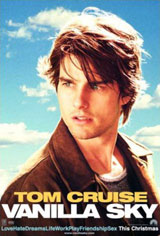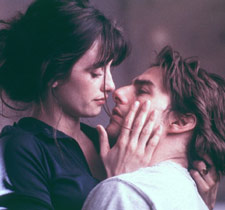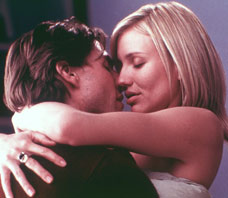| Vanilla Sky |
| |
 |
USA, 2001. Rated R. 135 minutes.
Cast: Tom Cruise, Penélope Cruz,
Cameron Diaz, Jason Lee, Kurt Russell, Timothy Spall, Noah Taylor, Tilda
Swinton, Johnny Galecki, Alicia Witt, Jennifer Aspen
Writers: Cameron Crowe, based on the Abre Los Ojos screenplay
by Alejandro Amenábar and Mateo Gil Rodríguez
Music: Nancy Wilson with songs by Paul McCartney, R.E.M., et
al.
Cinematographer: John Toll
Producer: Tom Cruise and Paula Wagner
Director: Cameron Crowe
LINKS
|
 he book
sits innocently on the table as inmate David Aames (Tom Cruise) tells his story
to psychologist Dr. Curtis McCabe (Kurt Russell), who is trying to determine
why Aames has been accused of committing murder. The lettering on the cover
is not easily discerned, but if you have this particular edition in your home,
you recognize it immediately. It is a copy of the Vintage Books edition of Memories,
Dreams, Reflections by Carl Gustav Jung. Its continued presence on the table
as the movie unfolds via flashback, even as Dr. McCabe professes not to be interested
in dreams, is the key to unlocking the riddles of Vanilla Sky. Vanilla
Sky is the latest in a series of mind-fuck movies released in the fall of
2001 that includes Waking Life, Mulholland
Drive, and Donnie Darko. All deal with dreams, subjective reality,
and the unconscious--as Julie Andrews might have sung, these are a few of Jung's
favorite things. Of these movies, Vanilla Sky is the most overtly Jungian
of the group. It is fundamentally about the relationship between the ego and
the unconscious, and practically a primer on the most fundamental concepts found
in any Jungian glossary.
he book
sits innocently on the table as inmate David Aames (Tom Cruise) tells his story
to psychologist Dr. Curtis McCabe (Kurt Russell), who is trying to determine
why Aames has been accused of committing murder. The lettering on the cover
is not easily discerned, but if you have this particular edition in your home,
you recognize it immediately. It is a copy of the Vintage Books edition of Memories,
Dreams, Reflections by Carl Gustav Jung. Its continued presence on the table
as the movie unfolds via flashback, even as Dr. McCabe professes not to be interested
in dreams, is the key to unlocking the riddles of Vanilla Sky. Vanilla
Sky is the latest in a series of mind-fuck movies released in the fall of
2001 that includes Waking Life, Mulholland
Drive, and Donnie Darko. All deal with dreams, subjective reality,
and the unconscious--as Julie Andrews might have sung, these are a few of Jung's
favorite things. Of these movies, Vanilla Sky is the most overtly Jungian
of the group. It is fundamentally about the relationship between the ego and
the unconscious, and practically a primer on the most fundamental concepts found
in any Jungian glossary.
|
Jung 101
Psychologist/philosopher Carl Jung (1875-1961)
believed that there are at least two levels of the unconscious, the individual
unconscious and the collective unconscious. The collective unconscious
is our collective memory and our inherited instincts and desires as members
of the human race. Because the collective unconscious is common to all
humanity, it explains why we tend to respond similarly to certain symbols,
ideals, and human dilemmas, which Jung called "archetypes." Not surprisingly,
archetypes fill our dreams and myths--our earliest and most resonant stories.
Jung himself objected to those who characterized
his ideas as somehow mystical. He saw the collective unconscious as inherited
thought patterns, noting that though human brains are all different, the
process of mental functioning is collective and universal. That universal
similarity is the collective psyche. The extent to which our psychology
is collective is astonishing, yet individuation is a psychological necessity.
Jung wrote that our personal psyche bears the same relationship to the
collective psyche as the individual to society. See "Relations between
the Ego and the Unconscious," The Portable Jung, Penguin Books, 1971,
pages 93, 103.
|
Originally a disciple of Freud, Jung became an almost-equally famous psychologist
in his own right. Jung came to the conclusion that there is more to us than
infantile tendencies and formative childhood experiences, which are the focus
of Freudian analysis. For Jung, the unconscious includes desires repressed by
our education and socialization, but there is more "psychic material that lies
below the threshold of consciousness."1 The unconscious is the foundation on which the conscious mind is
based.
As David speaks with Dr. McCabe, he wears a facial prosthetic--a form-fitting
latex mask that hides his face. He has been disfigured, we learn, and the mask's
perfect features hide the ugliness beneath. He cannot take it off; he needs
the mask to feel himself. The mask is his persona. Originally the name
for the mask worn by a stage performer, the term was used by Jung to describe
the face we present to society and even ourselves.2
David's persona--the role he plays--is that of an irresponsible, carefree
playboy who has inherited the controlling share of a magazine publishing empire,
along with a fantastic amount of money, from his father. He's got the fancy
apartment overlooking Central Park, the antique Mustang, the flat-screen TV
that retracts into the floor, and the "fuck-buddy," Julie Gianni, who looks
like Cameron Diaz. His best friend, Brian Shelby (Jason Lee), warns him that
someday he will find something deeper, beyond his shallow existence, and will
come to know what love really is. The catch, Brian continues, is that David
has got to experience pain and unhappiness, which he never has, in order to
appreciate things like love.
In a nutshell, that is what happens. Brian attends David's birthday party with
a new love interest named Sophia, played by Penélope Cruz. She is, unfortunately,
a distracting presence, because it is impossible to watch Sophia and the suddenly
jealous Julie without thinking of Cruz's real-life romance with Cruise and his
soap-opera divorce from Nicole Kidman. Cruz, incidentally, also appeared in
the Spanish-language Abre Los Ojos, of which Vanilla Sky is a
remake, though writer/director Cameron Crowe characterizes this work as more
of a re-interpretation. (I have not seen Abre Los Ojos and therefore cannot comment, and not
having seen it probably enhanced my enjoyment of Vanilla Sky, as it freed
me of expectations and reference points.)
(I have not seen Abre Los Ojos and therefore cannot comment, and not
having seen it probably enhanced my enjoyment of Vanilla Sky, as it freed
me of expectations and reference points.)
David is instantly attracted to Sophia, and chases her unrelentingly. Brian
is hurt. Julie, supposedly a casual-sex partner, is furious. Meanwhile, David's
loyal business associate, Thomas Tipp (Timothy Spall), warns him that his job
is in jeopardy. It all culminates in a horrible accident that leaves David's
perfect face hideously disfigured and Julie dead.
(All this you know from the movie trailer, but it is almost impossible to discuss
the movie without giving more things away. To avoid doing so as much as possible,
I'll continue to write in Jungian generalities. Nevertheless, those who prefer
avoiding spoilers altogether should read no further.)
Sophia and David spend only one night together, yet he becomes obsessed. Homophonic
last names and real-life romance aside, Cruise and Cruz lack onscreen chemistry,
so we must accept on faith that Sophia is the personification of David's ideal
woman. His attraction to her is irresistible because she is his anima,
his archetypal dream lover, the personification of the feminine nature in his
own unconscious. Jung posited that all men carry an ideal image of woman in
their heads and unconsciously project that image onto "the person of the beloved."3
It is also worth noting that "Sophia" is a Greek word that means wisdom, something
David sorely lacks. Therefore, his attraction to her simply is. While
in a different film we might legitimately complain about a lack of believability,
in this film it is acceptable, because an irresistible and inexplicable attraction
best serves the story and fits into the Jungian thematic whole.
David's attraction to Sophia and his sudden, related desire not to be seen
as a semi-idiotic playboy mean that he doesn't know himself very well. Though
he needs to be seen in a certain way by society to function, David's real self
is not compatible with the persona he wears. There is more to the self than
the conscious mind, which is ultimately why David starts rejecting elements
of his reality and begins to see apparitions of Julia (who is nothing other
than the flip side of Sophia). As Jung wrote, "there will always exist an indeterminate
and indeterminable amount of unconscious material which belongs to the totality
of the self."4
Thus, David is continually  admonished
by Sophia's disembodied voice (sometimes it belongs to Julia) to "Open your
eyes," a phrase that recalls Stanley Kubrick's swan song, Eyes
Wide Shut, which also stars Cruise.
admonished
by Sophia's disembodied voice (sometimes it belongs to Julia) to "Open your
eyes," a phrase that recalls Stanley Kubrick's swan song, Eyes
Wide Shut, which also stars Cruise.
David's disfigured face, which he sometimes hides with his mask, represents
his shadow. For Jung, the shadow is the inferior part of the personality,
the sum of all personal and collective psychic elements that, because of their
incompatibility with the chosen conscious attitude, are denied expression in
life and therefore coalesce into a relatively autonomous "splinter personality"
in the unconscious. Despite the negative connotations of the word "shadow,"
Jung meant it to encompass all those qualities that are suppressed, both positive
and negative. "The shadow personifies everything that the subject refuses to
acknowledge about himself and yet is always thrusting itself upon him directly
or indirectly."5
As one of the many prophets and philosophers in Waking Life might have
said, David's reality is subjective, and his shadow is breaking through into
consciousness. This is the source of the film's main conflict. In discussing
dream therapy and the difficulty of processing and assimilating the unconscious,
Jung wrote that several negative outcomes are possible--eccentricity, infantilism,
paranoia, schizophrenia, or regression (the restoration of the persona).6
The revelation and assimilation of David's unconscious is essentially the story
of Vanilla Sky.
AboutFilm.Com
The Big Picture
|
| Alison |
-
|
| Carlo |
A-
|
| Claudia |
-
|
| Dana |
-
|
| Jeff |
B-
|
| ratings explained |
Vanilla Sky seems unusually cerebral subject matter for Cameron Crowe,
who also directed Almost Famous, Jerry Maguire, and Say Anything,
all well crafted, but more interpersonal movies. He handles the high-flown subject
well, though, particularly the use of music (a Crowe strength), even if his
style is less distinctive here. Many of the actors, including Cruise (Jerry
Maguire), Lee (Almost Famous), and Noah Taylor (Almost Famous)
have worked with Crowe before. Cruise is somewhat limited as an actor, but he
is perfectly cast in these privileged, pretty-boy asshole roles. Cruz does not
do anything to justify her over-extended stay as flavor-of-the-moment (in the
United States), while Diaz justly transcended it several years ago, to the surprise
of many (including myself). Here she more than ably passes the audition for
the next Single White Fatal Attraction That Rocks the Cradle role that
comes along.
If Jung's ideas sound like a bunch of poppycock, then you should probably avoid
Vanilla Sky. Not being a psychologist, I can't effectively argue that
they are or they aren't, but I do find them fascinating. Jung seems to be a
favorite of filmmakers, probably because there is much more fodder for the artist
in his teachings than in Freud's it's-all-about-your-relationship-to-your-mother/father
perspective.
The Jungian motifs and themes in common with Waking
Life, Donnie Darko, and Mulholland
Drive (dreams, subjective reality, the unconscious, etc.) should be
readily apparent to anyone who has seen all those films. Waking Life
and Mulholland Drive were too confused, unfocused, and inconsistent in
tone, but Vanilla Sky errs too far in the opposite direction. Crowe pins
down the answers too clearly in the resolution when a little mystery, as in
Donnie Darko, might have been more satisfying. The seductiveness of Jung's
ideas lies in their mystery, after all. He wrote that full understanding of
the whole of our unconscious is impossible. The answers provided in Vanilla
Sky are a little limiting and the journey is a little long, but it's an
exciting exploration nonetheless.
ENDNOTES
1. See "Relations between the Ego
and the Unconscious," The Portable Jung, Penguin Books, 1971, page 71. [back]
2. Jung wrote:
One could say, with a little exaggeration, that the persona
is that which in reality one is not, but which oneself as well as others
think one is." ("The Archetypes and the Collective Unconscious," The
Collected Works of C.G. Jung, Vol. 9, i, par. 122f.)
It is, as its name implies, only a mask…that feigns individuality…whereas
one is simply acting a role . . . Fundamentally the persona is nothing real:
it is a compromise between individual and society as to what a man should
appear to be. He takes a name, earns a title, exercises a function, he is
this or that . . . [T]here is…something individual in the persona…yet the
unconscious self can never be suppressed to the point of extinction. ("Relations
between the Ego and the Unconscious," The Portable Jung, Penguin
Books, 1971, page 105-106.) [back]
3. Jung wrote:
Every man carries with him the eternal image of woman,
not the image of this or that particular woman, but a definitive feminine
image. This image is fundamentally unconscious, an hereditary factor of
primordial origin engraved in the living organic system of the man, an imprint
or 'archetype' of all the ancestral experiences of the female, a deposit,
as it were, of all the impressions ever made by woman . . . Since this image
is unconscious, it is always unconsciously projected on the person of the
beloved, and is one of the chief reasons for passionate attraction or aversion.
("The Development of Personality," The Collected Works of C.G. Jung,
Vol. 17, paragraph 338.) [back]
4. "Two Essays on Analytical Psychology,"
The Collected Works of C.G. Jung, Vol. 7, par. 274. [back]
5. "The Archetypes and the Collective
Unconscious," The Collected Works of C.G. Jung, Vol. 9, par. 284 f. [back]
6. Jung wrote:
Once the unconscious contents break through into consciousness,
filling it with their uncanny power of conviction, the question arises about
how the individual will react. Will he be overpowered by these contents?
Will he credulously accept them? Or will he reject them? . . . The first
case signifies paranoia or schizophrenia; the second may either become an
eccentric with a taste for prophecy, or he may revert to an infantile attitude
and be cut off from human society; the third signifies the regressive restoration
of the persona." ("Relations between the Ego and the Unconscious," The
Portable Jung, Penguin Books, 1971, page 112.) [back]
Analysis
© December 2001 by AboutFilm.Com and the author.
Images © 2001 Paramount Pictures. All Rights Reserved

 (I have not seen Abre Los Ojos and therefore cannot comment, and not
having seen it probably enhanced my enjoyment of Vanilla Sky, as it freed
me of expectations and reference points.)
(I have not seen Abre Los Ojos and therefore cannot comment, and not
having seen it probably enhanced my enjoyment of Vanilla Sky, as it freed
me of expectations and reference points.)
 admonished
by Sophia's disembodied voice (sometimes it belongs to Julia) to "Open your
eyes," a phrase that recalls Stanley Kubrick's swan song,
admonished
by Sophia's disembodied voice (sometimes it belongs to Julia) to "Open your
eyes," a phrase that recalls Stanley Kubrick's swan song, 